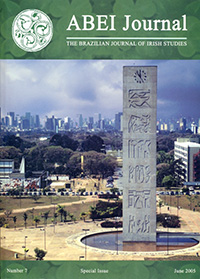Thomas Moore in Bermuda: Irish and African Liberties
DOI:
https://doi.org/10.37389/abei.v7i1.184278Keywords:
Thomas Moore, Bermuda, WritingsAbstract
“Thomas Moore in Bermuda: Irish and African Liberties,” takes as its subject Moore’s five month sojourn in Bermuda in 1803-04, where he traveled to take up an appointment as Registrar of the Court of Vice Admiralty. While employed by a colonial administration, Moore is unable to condemn the institution of slavery in Bermuda, while he is able to condemn slavery in the United States. When read in conjunction with Moore’s writings from the United States, Moore’s writings from Bermuda emerge as an important source for understanding his attitudes towards colonialism and slavery, as well for situating his later use of the trope of slavery in his writings on Ireland.
References
Jones, Howard Mumford. The Harp that Once: A Chronicle of the Life of Thomas Moore. New York: Henry Holt and Company, 1937.
Moore, Thomas. Memoirs, Journal, and Correspondence of Thomas Moore. Ed. Lord John Russell. Vol. 1 Russell. London: Longman, Brown Green and Longmans, 1853.
____. Thomas Moore’s Complete Poetical Works. New York: Thomas Y. Crowell, 1895.
____. The Letters of Thomas Moore. Ed. Wilfred S. Dowden. Oxford: Clarendon Press, 1964.
Strong, L.A.G. The Minstrel Boy: A Portrait of Tom Moore. New York: Alfred A. Knopf, 1937.
Whelan, Kevin. “The Green Atlantic: radical reciprocities between Ireland and America in the long eighteenth century,” A New Imperial History: Culture, Identity and Modernity in Britain and the Empire, 1660-1840. Ed. Kathleen Wilson. New York: Cambridge, 2004.
White, Terence de Vere. Tom Moore: The Irish Poet. London: Hamish Hamilton, 1977.
Downloads
Published
Issue
Section
License
Copyright (c) 2005 Margaret Mc Peake

This work is licensed under a Creative Commons Attribution-NonCommercial 4.0 International License.


